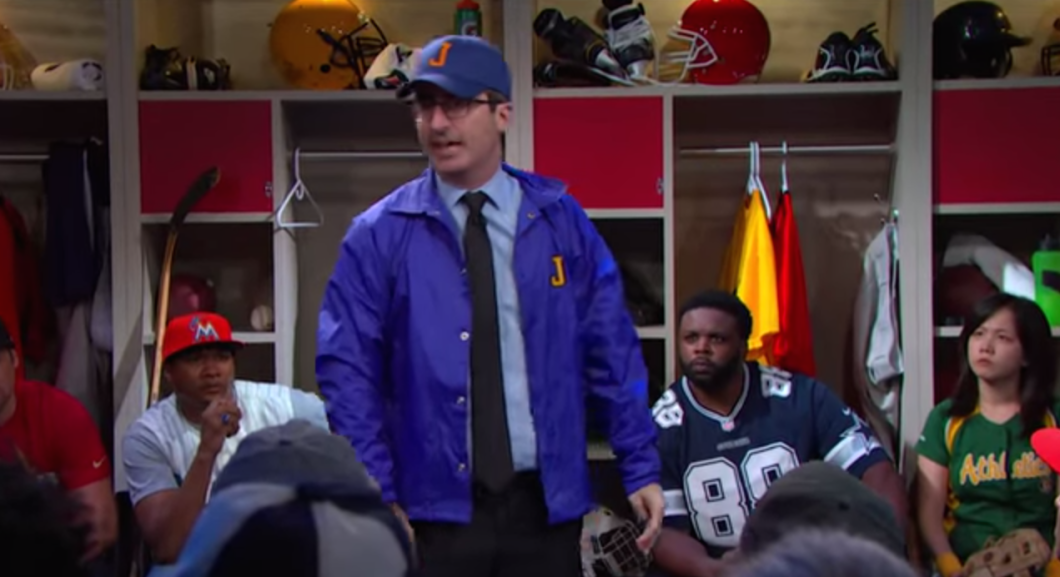John Oliver’s Rousing Speech Rallies American Sports Fans To Stop Wasting Public Money On Stadiums
 In spite of the fact that new sports venues often cost upwards of billions of dollars to construct, many American teams play in stadiums and arenas that are less than 25 years old. Heck, once the Atlanta Braves move into their new park, the Philadelphia Phillies’ Citizens Bank Park will be the most senior venue in the NL East — and that only opened in 2004. Whether it’s through municipal bonds, tax breaks, or free real estate, a lot of the money to pay for these venues ultimately comes out of taxpayers’ pockets.
In spite of the fact that new sports venues often cost upwards of billions of dollars to construct, many American teams play in stadiums and arenas that are less than 25 years old. Heck, once the Atlanta Braves move into their new park, the Philadelphia Phillies’ Citizens Bank Park will be the most senior venue in the NL East — and that only opened in 2004. Whether it’s through municipal bonds, tax breaks, or free real estate, a lot of the money to pay for these venues ultimately comes out of taxpayers’ pockets.
On Sunday’s Last Week Tonight, John Oliver looked into the billions in public money that has been sunk into new and renovated stadiums during the recent building bonanza of the last two decades — a construction spree that isn’t just about creating new arenas but about who can build the fanciest.
“You can now watch a game from a swimming pool suspended above the field, where the real contest for the fans is finding out whether or not HPV [human papillomavirus] can swim,” says Oliver. “My money’s on HPV; that’s a clutch STD.”
Most new stadiums “look like they were designed by a coked-up Willy Wonka,” he notes, citing examples like the field-level aquarium that sounds the playing field at the Florida Marlins’ recently opened stadium.
He gives the example of the $283 million in taxpayer funding that the Detroit Red Wings got from Detroit — a city that had just declared bankruptcy weeks earlier — and even though multibillionaire Little Caesars founder Mike Ilitch is the team’s owner.
“That’s a little hard to swallow,” says Oliver. “Not as hard to swallow as a Little Caesars Crazy Bread with an assortment of Caesar dips, but still pretty hard.”
In addition to giving teams money, tax breaks, or free land to build stadiums, cities often allow teams to retain virtually all of the revenue taken in at these municipally funded venues.
The John Oliver segment features footage from an interview with Florida Marlins president David Samson in which he cavalierly discusses how the team will keep all the money generated by events at the new stadium, but if you want to understand just how little regard he has for the people of Miami, look to Samson’s bio from when he was (very briefly) a contestant on CBS’s Survivor.
For his “Personal Claim to Fame,” Samson brags that he “Got local government in Miami to contribute over 350 million dollars to a new baseball park during the recession.”
You wouldn’t be shocked to learn that Samson was the first person voted out of the game that season.
Oliver also takes issue with the assertion that new stadiums result in economic boons to surrounding areas or longterm job growth, citing a review that found “no substantial evidence of increased jobs, income or tax revenues” from new stadiums.
“When you use public money for an expensive new stadium, you might find yourself unable to afford something you badly need,” pointing to troubles in Cincinnati, where the local government has spent millions on stadiums for the Bengals and Reds but has had to sell a public hospital, slash 1,700 jobs, and delay payments for local schools.
“Teams get these deals because they know politicians will capitulate and give them whatever they want,” says Oliver. “And you can almost sympathize because when politicians do stand up to teams it can cost them.”
In an attempt to persuade the American sports fan to rally against the spending of public funds on stadiums, Oliver dons his best coach’s windbreaker and cap and heads to the locker room to give a rousing speech:
“I know things look bad out there. These owners have been humiliating us for decades,” he begins. “Sure, we could just give up. We could roll over and let them do it to us for another twenty years… Or, right here — tonight! — we could decide to fight back!”
Lest anyone think Oliver is for some sort of stadium austerity, he explains, “I’m not saying we shouldn’t have giant aquariums and ballparks full of terrified fish — of course we should. This is America! If we don’t have them, no one else will. But we should not be using public money to pay for them.”
After explaining to the fans of St. Louis and San Diego that they still have plenty to be proud of even if their football teams leave — and after telling a man from Cincinnati that maybe he can’t afford to let the Bengals go — Oliver concludes with a rousing battle cry for fiscal responsibility.
“I want you all to get out there, and the next time a team comes around asking for a new stadium, I want you to make! them! pay!”
Want more consumer news? Visit our parent organization, Consumer Reports, for the latest on scams, recalls, and other consumer issues.

